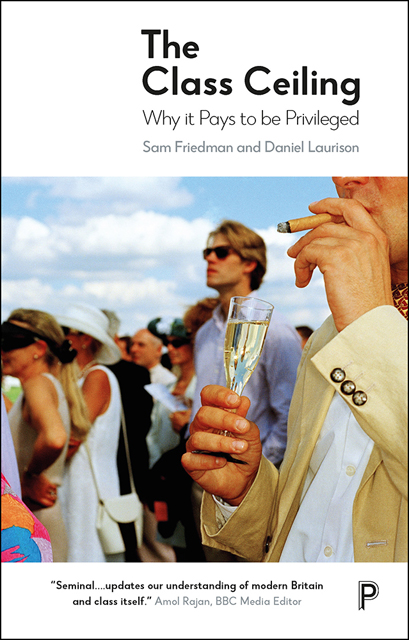Book contents
- Frontmatter
- Dedication
- Miscellaneous Frontmatter
- Contents
- List of figures and tables
- Acknowledgements
- Note on language usage
- Introduction
- one Getting in
- two Getting on
- three Untangling the class pay gap
- four Inside elite firms
- five The Bank of Mum and Dad
- six A helping hand
- seven Fitting in
- eight View from the top
- nine Self-elimination
- ten Class ceilings: A new approach to social mobility
- eleven Conclusion
- Epilogue: 10 ways to break the class ceiling
- Methodological appendix
- Notes
- References
- Index
six - A helping hand
Published online by Cambridge University Press: 14 April 2023
- Frontmatter
- Dedication
- Miscellaneous Frontmatter
- Contents
- List of figures and tables
- Acknowledgements
- Note on language usage
- Introduction
- one Getting in
- two Getting on
- three Untangling the class pay gap
- four Inside elite firms
- five The Bank of Mum and Dad
- six A helping hand
- seven Fitting in
- eight View from the top
- nine Self-elimination
- ten Class ceilings: A new approach to social mobility
- eleven Conclusion
- Epilogue: 10 ways to break the class ceiling
- Methodological appendix
- Notes
- References
- Index
Summary
In 1960, the pioneering American sociologist Ralph H. Turner wrote a prescient article in the American Sociological Review. In it, he introduced the concepts of ‘sponsored’ and ‘contest’ mobility. In contest mobility, success is the prize in an open tournament, and the contest is only judged to be fair if all players compete on an equal footing. Here victory must be won by one’s own efforts, and the most satisfactory outcome is not necessarily the victory of the most intelligent, or most educated, but the most deserving. The tortoise that defeats the hare, he wrote, was thus both possible and appreciated in these contexts. In contrast, in sponsored mobility, individuals reach the top largely because they are selected by those already in senior positions and carefully inducted into elite worlds. Thus, upward progression is granted or denied based on whether established elites judge a candidate to possess the qualities they wish to see, or the ‘merits’ they value. As Turner notes, this type of ‘upward mobility is like entry into a private club, where each candidate must be sponsored by one or more members.’
Turner saw the UK as the exemplar of sponsored mobility. His article conjured images of an antiquated old boy network, where elite appointments are contingent on a set of ‘old school tie’ connections who ‘pull strings’ for one another, and whose relationships are rooted in the shared experience of ‘public’ schooling, Oxbridge and private members clubs. Yet the power of this old boy network is thought by many to have waned considerably in the last 60 years. Indeed, many have argued that a number of countervailing forces, such as the expansion of secondary and higher education, the decline of the landed aristocracy, rising absolute rates of social mobility, and the achievements of second-wave feminism, have fundamentally eroded this kind of elite closure.
This is not to say that who you know is not considered important today; research showing the power of networks in elite professions is voluminous. Yet in recent decades this has tended to focus on the power of what sociologist Mark Granovetter famously called ‘weak ties’. Here the emphasis is on the importance of forging a multitude of informal professional contacts, on being a good ‘networker’, especially with those in positions of power.
- Type
- Chapter
- Information
- The Class CeilingWhy It Pays to Be Privileged, pp. 109 - 122Publisher: Bristol University PressPrint publication year: 2019



